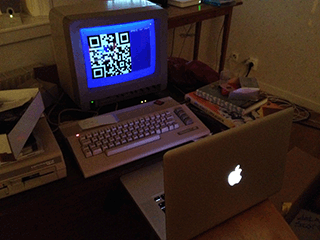|
| |
Credits :
Download :
Look for downloads on external sites:
Pokefinder.org
User Comment
Submitted by Repose on 8 April 2012
I think it's really cool!
You should check the thread at top, I'm working on a full video-transfer method that could dump an entire 512KB REU in 2 seconds. I can nearly read, accurately, an entire 160x200 screen at once (in 4 grey levels).
Simpler is a charset with binary white lines, such that bytes in screenmem are directly represented, and decoded similar to teletext. |
User Comment
Submitted by linde on 3 April 2012
| enthusi: With a raster split, you could get a byte at once, sync in one frame and deliver data at 400bps :D |
User Comment
Submitted by Mr. SID on 2 April 2012
| Can we have a video chat connection in between? Over a phone connection? I'm available for remote tests... :) |
User Comment
Submitted by Jak T Rip on 2 April 2012
| Very useful for making multiple backups of your data if you just set up multiple laptops that all watch the Commodore. Priceless. |
User Comment
Submitted by enthusi on 2 April 2012
or you can use d021 alone to transfer nibbles pretty quickly ;-)
THAT could be done in a basic-few-liner. As long as you stay below 25 FPS or so, its save. You can sync with d020 ;-) |
User Comment
Submitted by MagerValp on 2 April 2012
Somehow reminds me of http://www.hugolyppens.com/VBS.html
If I were to do this seriously I'd go for a custom character set encoding 4 bits per character, and some error correction on each row. 400 bytes per frame shouldn't be hard, and if you press space fast enough it'd be faster than kernal loading at least. |
User Comment
Submitted by Conrad on 2 April 2012
Well it's bound to have the big disadvantage that is unable to transfer from laptop/PC to C64/1541.... nevertheless, a tool of this principal would be a dream for the disk transfer crew. ;)
@enthusi: If the colour saturations/brightness/contrast are set correctly, how about a 80x25 colour matrix ($d011=$3b, $d016=$08, $d018=$80, $dd00=$02, $4000-$7fff filled with $5a (or is it $a5?)), then each byte in $6000-$63e8 can represent non-GCR-decoded GCR-encoded data? .... perhaps I gave away too much there ;) but oh well. |
User Comment
Submitted by TheRyk on 2 April 2012
Being aware of yesterday's date, I was 95% sure that this must be april foolery. Nevertheless I tried with several files, so I guess you got me. :D
Like the idea, however, though I have various cable solutions and see a problem if you wanna let PC communicate with you C64 in the other direction. |
User Comment
Submitted by enthusi on 2 April 2012
Very nice concept and carried out well (good timing :), but I really, really dont get the hype to find cable-less solutions to things that work soooo much better with cables ;-)
I guess today's webcams are stable enough to properly decode a whole 40x25 black-white matrix and hence 125 byte as well. Superfast generation on C64-side but dedicated software on PC-side... |
User Comment
Submitted by Sander on 2 April 2012
User Comment
Submitted by Total Chaos on 2 April 2012
Wasn't there a wristwatch ~95-96 that could sync with Outlook or something?
You held it up to the screen and the screen flashed a series of lines on the screen to send data...
Maybe something like a OCR-software on the PC and just dump whatever the drive reads to screen? ;)
|
User Comment
Submitted by Rough on 1 April 2012
User Comment
Submitted by wacek on 1 April 2012
| This actually could be a start of something brilliant :) What we need is a mac/pc client, some speed-testing tool (different webcams work with different refresh rates), crc in the algorhithm itself, disk-reading and d64-creation on the receiving end... Then, who'd need cables anymore? :) |
User Comment
Submitted by Digger on 1 April 2012
User Comment
Submitted by CreaMD on 1 April 2012
User Comment
Submitted by MagerValp on 1 April 2012
| Transfer system that doesn't require any hardware other than a laptop with a webcam, as discussed here: Simple C64->PC transfer |
|
|
|
 | Search CSDb |
|
 | Navigate |  |
|
 | Detailed Info |  |
|
 | Fun Stuff |  |
|
 | Forum |  |
|
 | Support CSDb |  |
|
 |  |
|


